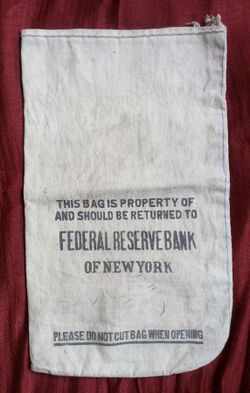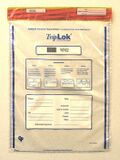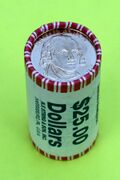Currency packaging
Topic: Finance
 From HandWiki - Reading time: 6 min
From HandWiki - Reading time: 6 min


Currency packaging includes several forms of packing cash for easy handling and counting. Many systems use standard color-coding or are marked to indicate the amount in the package.
Currency straps

Currency straps, also known as currency bands or bill straps, are a type of fastener used to secure discrete numbers[clarification needed] of bills. Typically, currency bands have attached ends, so that bills are "curled" and slipped into the band, whereas currency straps have adhesive on the ends to secure them around the bills after wrapping. Straps can be applied manually, or automatically by a Currency-counting machine.
Currency vacuum packaging
Generated bundles are packed together in groups of 10 (1000 banknotes) and vacuumized. A cliche print[clarification needed] containing bank and branch details is applied to the plastic package seal. Vacuum packing is the most reliable and effective way of storing currency, which is protected against tarnishing, e.g. from moisture and dirt. Vacuum-packed banknotes also take up less space in containers used for transportation. Currency units are vacuum packed using a vacuum sealer.
Plastic security envelopes

Plastic envelopes and "deposit bags" are used to hold paper currency, stocks, bonds, etc.[1][2][3][4] These are usually tamper evident, and have labels on the front to make notes. Most plastic bags have pressure sensitive adhesive applied and covered with a release liner. The liner is removed and the bag is sealed. Various forms of tamper-evident technology are used to improve security. Many bags have an irreversible imaging feature involving the selective transfer of adhesive when opened.
Other containers
Fabric bags (see Money bag) are heavy duty cloth (woven and non-woven) bags are used to hold coins, rolls of coins, or bundles of banknotes. Bags can be tied shut, sealed with a cable tie or secured with a special security seal using tamper-evident technology.

Coin wrappers are paper or plastic tubes used to hold a specific number of coins.
Currency trays are trays used to handle currency, often sorting it by denomination.
See also
- Dye pack
- Cash-in-transit
- Euro starter kits
References
- ↑ "Sealed Bag deposit Process". Northwestern University. 2016. http://ffra.northwestern.edu/documents/training/gl/740/course/SealedBagDepositProcess.pdf.
- ↑ Bank of America (2015). "Preparing and Packaging Cash Vault Deposits". Harvard University. http://otm.finance.harvard.edu/files/otm/files/deposit_preparation_guide.pdf.
- ↑ Palazzolo, John, "Security envelope", US patent 5918983, published 1999-07-06, assigned to Control Paper Co. Inc.
- ↑ Vetter, Kurt W., "Tamper-resistant envelope", US patent 5788377, published 2000-04-11, assigned to Uniflex Inc.
- Yam, K.L., "Encyclopedia of Packaging Technology", John Wiley & Sons, 2009, ISBN 978-0-470-08704-6
- Soroka, W, Illustrated Glossary of Packaging Terminology Institute of Packaging Professionals, [1]
 |
 KSF
KSF